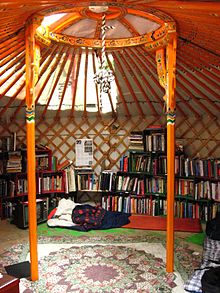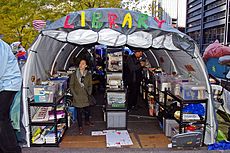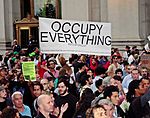- The People's Library
-
The People's Library The People's Library in November 2011 Country United States Type Public library Established 2011 Location New York City Collection Size 5,554 References: [1] The People's Library, also known as Fort Patti[2][3] or the Occupy Wall Street Library, is a public library founded in September 2011 by Occupy Wall Street protesters in lower Manhattan's Zuccotti Park located in the Financial District of New York City.[4] It was temporarily evicted and saw its collection badly damaged when Zuccoti park was cleared on November 15 2011.[5]
Contents
History
Founded shortly after Occupy Wall Street activists began protesting, the People's Library began after a cardboard box full of books was left at Zuccotti Park by a library science student from New York University.[3][6][7] A weather event then resulted in the loss of the collection, which prompted Betsy Fagin to bring the idea of an official library before the movement's General Assembly a few weeks later.[3] The assembly appointed Fagin as librarian and a second collection was started.[3] As time passed, volunteers began receiving additional books and resources from readers, private citizens, authors, and even corporations.[2] In one such instance, musician Patti Smith contributed a tent to the library, which was named Fort Patti in her honor and used as the library's primary structure until being destroyed in November.[2][3] The library has on occasion received volunteer assistance from the local homeless population, according to a librarian from the New York Public Library.[3]
Collection
The library had 5,554 books cataloged in LibraryThing as of November 2011, and its collection was described as including some rare or unique articles of historical interest that originated as a result of the Occupy protests.[1] According to American Libraries, the library's collection had "thousands of circulating volumes," which included "holy books of every faith, books reflecting the entire political spectrum, and works for all ages on a huge range of topics."[2] A librarian was quoted as saying that "donated books are never rejected, even if they seem at odds with the ideology behind the protest."[8] Unique articles include the Occupy Wall Street Poetry Anthology, which was compiled by the library based on its live poetry sessions and featured poets such as Adrienne Rich and Anne Waldman "alongside high school kids."[9][10]
Zuccotti Park raid
Writers Jennifer Egan, Lynn Nottage and Jonathan Lethem giving a reading at the library on November 7, 2011
During the early morning of 15 November 2011, city workers from the Police Department and Sanitation Department forcibly evacuated members of the public and their property from the privately owned public space known as Zuccotti Park, after consensus was reached by city officials and park owners Brookfield Office Properties who claim the eviction was justified because of public health and environmental issues despite the fact that the camp was formed as a protest against government and corporate collusion and mismanagement.[1] The People's Library facility was among the assets seized.[11] Following the police action, Rolling Stone editor Jeff Sharlet reported seeing what he thought was the library's books being thrown into dumpsters.[11]
New York City mayor Michael Bloomberg stated that the library's collection was safely stored at the sanitation garage on 57th Street, and that they could be retrieved on the following Wednesday.[12] After library representatives returned from the sanitation garage on Wednesday, they posted on the library's website that most of its collection and equipment had been either destroyed, damaged, or lost. Among property purported to be missing or ruined beyond repair was the large tent that housed the library (including its necessary infrastructure), laptops and rubber stamps bearing marks used to identify library resources.[12][11] In all, library representatives reported recovering 26 boxes of books from the city.[13]
Reaction
In response, the American Library Association issued a statement decrying the dissolution of the library, saying that it was "unacceptable," because libraries "serve as the cornerstone of our democracy and must be safeguarded." The ALA added that the "very existence of the People’s Library demonstrates that libraries are an organic part of all communities," and that libraries "serve the needs of community members and preserve the record of community history." Particularly of concern was the loss of rare historical documents and records, many of which it said are endemic to the Occupy movement.[1] Many of the library's reference materials and some of its regular books lost were autographed by their authors, either while visiting the library or through courier to express moral support.[citation needed]
The executive director of Common Cause said in a statement that the City should "replace each title, buying two new copies for each one destroyed," and "for whatever number is unaccounted for, the city should provide Occupy’s librarians with funds sufficient to buy twice as many."[5][14] UC Irvine history professor Mark LeVine expressed his sentiment that "tents can be replaced, even most personal effects. But destroying books is like destroying the soul of the movement," and filmmaker Udi Aloni added that "When they disrespect books, they disrespect humankind, and when they destroy books, they destroy the spirit of humanity. The library was great because people gave more than they took. OWS was not just a place for activism, but also a place for education and rethinking; not for just blathering on when you don't know, but being humble and willing to learn. By taking out the library, they've tried to stop that crucial process."[15]
Editors at 2600: The Hacker Quarterly mourned the loss of the library's donated electronics and computer equipment, which they believed to have been destroyed by a blunt object.[16]
Restoration
Efforts to restore the library were initiated shortly after its seizure.[2] The library started a third collection with 100 replacement books, which were also then subsequently surrounded by police and confiscated by sanitation workers on the night of 16 November 2011.[2][15][17] A fourth collection was formed on 17 November 2011 and is currently being stored in mobile carts.[5]
Services
The library operates 24/7 and uses an honor system to manage returns.[3][10] It offers weekly poetry readings on Friday nights, provides a reference service that is frequently staffed by professional librarians, and can procure materials available through the interlibrary loan system.[1][6][3][18] The library's cataloging system is accessible online at LibraryThing, which donated a free lifetime membership.[3] Prior to the Zuccotti park raid, a lighted reading room, public laptop computers and a Wi-Fi network were also offered.[2][3]
Branches
Sister libraries
 A library formed by Occupy Toronto activists is located in a traditional Mongolian Yurt at St. James Park in Canada
A library formed by Occupy Toronto activists is located in a traditional Mongolian Yurt at St. James Park in Canada
Since the formation of the library, activists at related protests throughout North America and in Europe have formed several sister libraries.[3][19][20]
References
- ^ a b c d e "ALA alarmed at seizure of Occupy Wall Street library, loss of irreplaceable material" (Press release). American Library Association. 2011-11-17. Archived from the original on 2011-11-19. http://www.webcitation.org/63J2BDwBW. Retrieved 2011-11-19.
- ^ a b c d e f g Zabriskie, Christian (2011-11-16). "The Occupy Wall Street Library Regrows in Manhattan". American Libraries. Archived from the original on 2011-11-19. http://www.webcitation.org/63J3Pw49t. Retrieved 2011-11-19.
- ^ a b c d e f g h i j k Zabriskie, Christian (2011-10-18). "A Library Occupies the Heart of the Occupy Movement". American Libraries Magazine. Archived from the original on 2011-11-20. http://www.webcitation.org/63Kj0ifup. Retrieved 2011-11-20.
- ^ Diaz, Shelley (2011-10-20). "Occupy Wall Street's Library Keeps Growing". School Library Journal. Archived from the original on 2011-11-20. http://www.webcitation.org/63LjJOTpi. Retrieved 2011-11-21.
- ^ a b c "ALA Condemns Seizure of Occupy Wall Street People's Library". School Library Journal. 2011-11-18. Archived from the original on 2011-11-20. http://www.webcitation.org/63LZkTgyf. Retrieved 2011-11-20.
- ^ a b Nader, Alexia (2011-09-29). "The Occupy Wall Street Library". The New Yorker. Archived from the original on 2011-09-29. http://www.webcitation.org/63LiPpYc0. Retrieved 2011-11-21.
- ^ Pous, Terri (2011-10-10). "Occupy Wall Street: Their Own Mini-Government, Complete With Library". Time. Archived from the original on 2011-11-20. http://www.webcitation.org/63LlPzTiG. Retrieved 2011-11-21.
- ^ King, Ritchie (2011-10-24). "For Quiet Moments Between Protests, a Growing Library". The New York Times. Archived from the original on 2011-11-20. http://www.webcitation.org/63KqK9nez. Retrieved 2011-11-20.
- ^ Greenberg, Emily (2011-11-08). "A Truly Public Library". The Cornell Daily Sun. Archived from the original on 2011-11-20. http://www.webcitation.org/63KvvKL6j. Retrieved 2011-11-20.
- ^ a b Tharoor, Ishaan (2011-10-25). "From Chomsky to the Onion: What’s on the Shelves at Occupy Wall Street’s Library". Time. Archived from the original on 2011-11-20. http://www.webcitation.org/63LkTSXCw. Retrieved 2011-11-21.
- ^ a b c Witt, Emily (2011-11-18). "American Library Association Condemns Destruction of OWS People’s Library". The New York Observer. Archived from the original on 2011-11-19. http://www.webcitation.org/63J1esFlO. Retrieved 2011-11-19.
- ^ a b Howard, Greg (2011-11-16). "OWS Library: Thousands of Books Missing, Destroyed". Slate. Archived from the original on 2011-11-19. http://www.webcitation.org/63J4JQsWw. Retrieved 2011-11-19.
- ^ Attenberg, Jami (2011-11-17). "How I helped rescue the OWS library". Salon. Archived from the original on 2011-11-19. http://www.webcitation.org/63J7AawJ7. Retrieved 2011-11-19.
- ^ "Mayor Bloomberg should replace books lost in Zucotti Park police raid" (Press release). Common Cause. 2011-11-17. Archived from the original on 2011-11-20. http://www.webcitation.org/63LZyCsbt. Retrieved 2011-11-20.
- ^ a b LeVine, Mark (2011-11-17). "The People's Library and the future of OWS". Al Jazeera. Archived from the original on 2011-11-19. http://www.webcitation.org/63JEusc69. Retrieved 2011-11-19.
- ^ "Donated Laptops for "Occupy Wall Street" Destroyed in NYPD Action". 2600: The Hacker Quarterly. 2011-11-18. Archived from the original on 2011-11-19. http://www.webcitation.org/63KFfsDSx. Retrieved 2011-11-20.
- ^ Greenberg, Michael (2011-11-18). "Occupy Wall Street Turns a Corner". The New York Review of Books. Archived from the original on 2011-11-19. http://www.webcitation.org/63JOHqwfw. Retrieved 2011-11-19.
- ^ "Voices from Zuccotti: Steve Syrek, 33". The New York Daily News. YouTube. http://www.youtube.com/watch?v=pUFn8kKDwuk. Retrieved 2011-11-20. "I've even got one guy who wants to help us procure any materials we want from the interlibrary loan system, which means we are a legitimate, fully functioning research library. Someone could come here and request an article of any kind and we could theoretically get it for free and give it to them."
- ^ Fister, Barbara (2011-10-27). "Why the Occupy Wall Street Movement Has Libraries". Library Journal. Archived from the original on 2011-11-20. http://www.webcitation.org/63KgMq1H4. Retrieved 2011-11-20.
- ^ Saltzman, Rebecca (2011-11-02). "From Spectator to Participant: How the Last Week Changed My Relationship With Occupy Oakland". BeyondChron. Archived from the original on 2011-11-20. http://www.webcitation.org/63KexS6FL. Retrieved 2011-11-20.
External links
Categories:- Public libraries in New York City
- Organizations established in 2011
- Occupy movement in the United States
- Occupy Wall Street
- Community organizing
Wikimedia Foundation. 2010.



